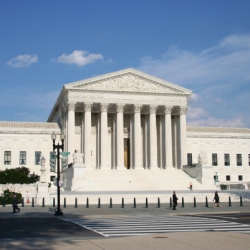The New Jersey sports betting case is close to being heard in the U.S. Supreme Court. On Tuesday, the court’s justices decide whether they will hear the case or not.
In a similar 2014 case, New Jersey’s appeal was rejected by the Supreme Court. The fact the current appeal has gotten a step further gives proponents some hope the Supreme Court will hear the case this time.
On Monday, the court re-listed the case as part of its “cleanup conference”. The relisting caused speculation, because it was one step further than New Jersey’s 2014 appeal got. The Supreme Court will hear New Jersey’s case. The court could remanded the case to the lower courts or reject its request altogether. Given previous cases, anything but outright rejection is taken as a good sign.
Dennis Drazin on Supreme Court Case
Dennis Drazin, a lawyer for Monmouth Park, a key player in the case, said he takes the Monday decision as a good sign. Drazin said, “I consider it good news that we didn’t receive notice that our case would not be heard. At this point, anything is possible.”
Daniel Wallach, a gaming lawyer out of Fort Lauderdale, said that about half of the cases the Supreme Court re-listed last year were either heard by the justices or vacated and remanded to the district courts.
Saying that about 1% of cases referred to the Supreme Court receive a hearing, Mr. Wallach said, “This is a promising sign for New Jersey.”
Chris Christie Supports Legal Sportsbooks
When Gov. Chris Christie asked the US Supreme Court to hear a similar sports betting appeal in 2014, the court rejected the motion. At the time, New Jersey reworked its state laws in a second attempt to beat the Professional and Amateur Sports Protection Act (PASPA).
First, New Jersey’s legislature repealed their sports betting regulations. Then the Christie administration signaled it would look the other way while Monmouth Park and William Hill opened a sportsbook. That led to a lawsuit by the major US sports leagues against Monmouth Park and the State of New Jersey.
New Jersey’s Sports Betting Case
Throughout both sets of cases, New Jersey has lost 5 previous court decisions. New Jersey originally lost a sports betting lawsuit brought by the sports leagues in the U.S. District Court of Judge Michael Shipp, brother of former NFL running back Marcel Shipp. New Jersey’s appeal was rejected in the Third Circuit Court of Appeals in Philadelphia. That led to the previous attempt to gain a hearing in the Supreme Court.
In the 2014 lawsuit, Judge Shipp once again sided with the sports leagues. Then the Third Circuit Court of Appeals once again upheld Shipp’s ruling. New Jersey uses the “en banc” appeals process, which required all the sitting judges in the 3rd Circuit Appeals Court to hear its appeal. The court agreed to see the case, which was seen as a positive sign. Then the court rejected the appeal with a 10-2 decision.
Supreme Court Nears a Decision
Pro-legalization followers of the Supreme Court case should take a note of caution from that example. Even if the court’s justices agree to hear the case, it does not mean the hearing will be a success. Given recent history, the Supreme Court is not likely to side with New Jersey on this case.
At face value, PASPA seems to be a clear case of the United States federal government playing favorites. The Commerce Clause of the US Constitution states the federal government has the right to regulate interstate trade, but only to foster trade. The DC government is not supposed to favor one state over the others. Because Nevada is given the right to operate sportsbooks and all other states cannot, PAPSA appears unconstitutional.
PASPA: Constitutional or Unconstitutional?
The framers of the law back in 1992 added a stipulation, though. Nevada’s received a grandfather clause for its sportsbooks, just as Delaware, Montana, and Oregon’s sports lotteries received an exemption. Under terms of the PASPA, the remaining 46 states had 1 year to pass sports betting laws. If they did, their laws would receive an exemption. New Jersey had support for legal sportsbooks, but its leadership barred a pro-PASPA bill from reaching the house floor.
Because the other states were given a grace period to bring their laws into alignment with the PASPA, previous judges have decided the law is constitutional. The Supreme Court justices are likely to rule the same way.
US Supreme Court to Hear New Jersey Sports Betting Appeal
In an update, the US Supreme Court announced on Tuesday morning it would hear New Jersey’s arguments in its sports betting appeal. PASPA is about to be challenged in the highest court in the land.

